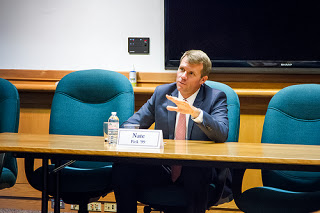- Public Policy
- Leadership
- Funding
- News & Events
- About the Center
Back to Top Nav
Back to Top Nav
Back to Top Nav
Back to Top Nav

Fick began the session by examining the differences between legal authority, which comes with titles and hierarchies, and moral authority, which necessitate the leader truly taking care of his or her followers. He emphasized that sending, or directing, is not the same as leading, which inherently requires servitude and leading by example. He also acknowledged the challenges faced by leaders, including dealing with deception or misinformation, investing in the right followers, and creating the right culture for maintaining goals, values, and drive. After his overview, students then had the chance to ask any questions they had, and from this discussion, we learned about cultivating trust and legitimacy, avoiding hiring traps, building in personal time to work schedules, and seeing the dangers in judging leadership off of charisma alone.
To end the session, Fick brought in pieces of his personal story, contained within two decision-making scenarios that the group was asked to contemplate. What we learned from the gut-wrenching situations was that leaders are the ones responsible for solving the toughest of dilemmas, even when there isn’t a clear answer. While thinking through these decisions, leaders must balance morality with obligation, conscience with constraints. Without spoiling the details of the scenarios, which can be found in Fick’s book “One Bullet Away: The Making of a Marine Officer,” it became evident that sometimes there isn’t a correct answer, so a leader must be prepared to deal with the consequences. Fick himself used and still uses a litmus test for moral authority when making decisions that impact others, and he urges, given that there is adequate time to think, that we similarly put careful reflection into our choices and actions.
"The material that resonated most with me was Solitude and Leadership, the West Point address by William Deresiewicz. "Leadership and aptitude, leadership and achievement, leadership and even excellence have to be different things, otherwise the concept of leadership has no meaning." That was what did it for me. It's so easy to think we're all leaders just because we're here at Dartmouth. And while we may have been leading the class in GPA and extracurriculars enough to get us here, that doesn't make us leaders. I'm not a leader because I'm ahead of everyone. I'm just one of those "people who can climb the greasy pole of whatever hierarchy they decide to attach themselves to." And these are the kinds of people who "lead" us today." -Amber Porter '14